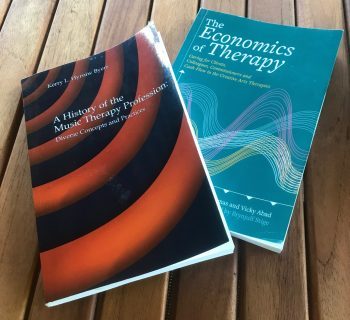I’m continuing an idea started last summer to churn through multiple work-related books in the “off” summer break. (“Off” in written air quotes as many academics understand the work, particularly the scholarly and creative work, never stops…it just changes tempo.)
I begin my 2018 summer reading list with two music therapy-related texts, both of which hit my radar last fall
Review of A History of the Music Therapy Profession
First up is Kerry L. Hyrniw Byers’ book A History of the Music Therapy Profession: Diverse Concepts and Practices, published by Barcelona Publishers in 2016.
Here, Byers seeks to provide a global history of the profession of music therapy, beginning with pre-organizational activity in the 1930s through the 21st century to date. Her ultimate aim seems to be to highlight the diversity of the field which, though it has its strengths, also presents the challenge of making “music therapy” difficult to define.
This is not a new concept. In fact, I begin training my students in intro to music therapy to tailor their description of music therapy to their audience. But one aspect I appreciate about Byer’s framing of the issue is that she ties in theory—Abbott’s “Systems of Professions” theory—to provide perspective as to which areas of jurisdictional control define us as a profession (and how that has evolved over the years).
Another aspect of her book that I appreciate on a personal level is the focus on providing a global history. Although I am well-versed in the history of music therapy, I am quite US-centric in my knowledge. So I enjoyed learning about the growth of music therapy practice in other countries where the profession is more established.
Ultimately, Byers provides a useful, easy-to-digest summary of historical trends in the growth of the profession, organized by professional activities, clinical developments, theoretical developments, and philosophical developments. It’s a concise introduction, of potential use in a graduate music therapy course or for a music therapist looking to gain a bit of perspective.
P.S. My colleague Teresa Lesiuk introduced me to this book. She published a review in Music Therapy Perspectives last year, which you can find here: https://doi.org/10.1093/mtp/mix020
Review of The Economics of Therapy
Next up is The Economics of Therapy: Caring for Clients, Colleagues, Commissioners and Cash-Flow in the Creative Arts Therapy, published by Jessica Kingsley Publishers in 2017. This book, edited by Daniel Thomas (UK music therapist and joint managing director of Chroma) and Vicky Abad (Australian music therapist and founder/managing director of Music Beat) explores the economics of being a creative arts therapist (which includes music therapists) in the current healthcare climate.
They pull together a team of contributing authors to explore topics such as entrepreneurship, ethics in marketing, and educating students. Much of the information is based on personal stories, with four chapters as dedicated case studies. For example, Vicky (Ch. 9) and Dan (Ch. 10) each shared how they started in their respective businesses, and examined the successes and challenges they faced as their businesses continued to expand and develop over the years.
Others connect topics to larger concepts and themes, thus providing some framing or perspective. For example, Alison Ledger (Ch. 2) explores common processes that emerged from her research on entrepreneurship—identifying opportunities and barriers, building relationships, being creative and flexible, and maintaining passion and persistence.
What I appreciate about this book (particularly as a former small business owner) is that it is not just about being in private practice—the concepts and ideas apply to any situation in which you are developing a new program, even if as an employee. I also find this book has a nice balance between sharing personal stories and providing a clear description of key concepts and ideas important to developing sustainable programs. Furthermore, each chapter comes with a set of exercises for the reader to explore concepts described in that chapter.
Given the complexity of healthcare systems and the ephemeral nature of government-sponsored financial support for clients, The Economics of Therapy would be useful to preprofessionals who need to think about some of these issues (and be inspired to stay persistent), as well as professionals looking to examine their programs in new ways.



 orcid.org/0000-0001-8665-1493
orcid.org/0000-0001-8665-1493






{ 2 comments… read them below or add one }
It is a helpful post for a musician. This post helps a person know an unknown things.
Thank you very much for share a helping post!
3ee as a book review website, is glad to find your blog. take a look at our blog and we’d appreciate your comments!
You must log in to post a comment.